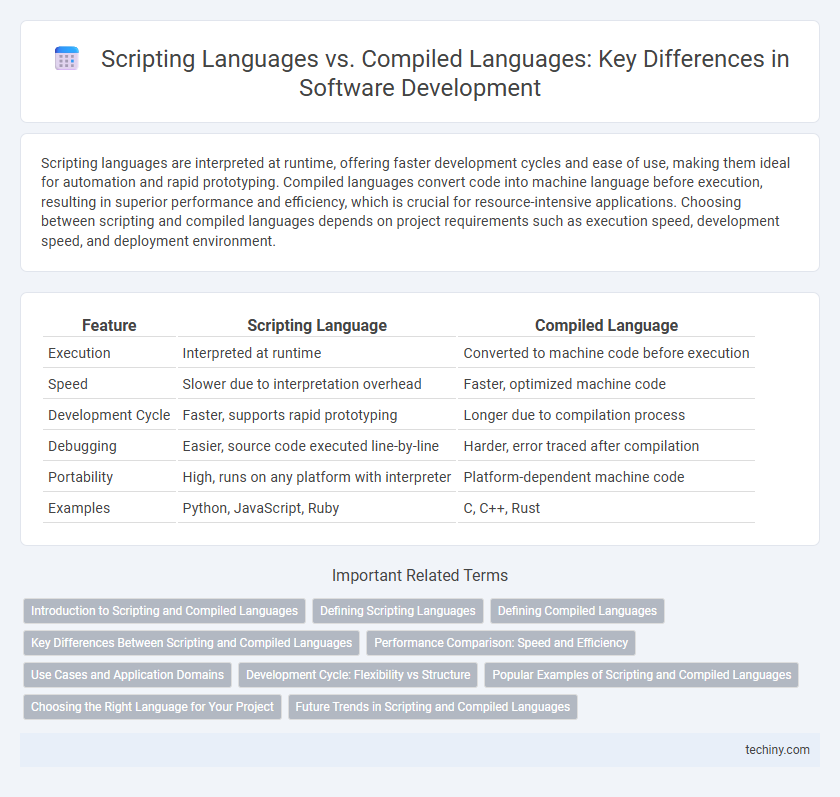Scripting languages are interpreted at runtime, offering faster development cycles and ease of use, making them ideal for automation and rapid prototyping. Compiled languages convert code into machine language before execution, resulting in superior performance and efficiency, which is crucial for resource-intensive applications. Choosing between scripting and compiled languages depends on project requirements such as execution speed, development speed, and deployment environment.
Table of Comparison
| Feature | Scripting Language | Compiled Language |
|---|---|---|
| Execution | Interpreted at runtime | Converted to machine code before execution |
| Speed | Slower due to interpretation overhead | Faster, optimized machine code |
| Development Cycle | Faster, supports rapid prototyping | Longer due to compilation process |
| Debugging | Easier, source code executed line-by-line | Harder, error traced after compilation |
| Portability | High, runs on any platform with interpreter | Platform-dependent machine code |
| Examples | Python, JavaScript, Ruby | C, C++, Rust |
Introduction to Scripting and Compiled Languages
Scripting languages, such as Python and JavaScript, are interpreted at runtime, enabling rapid development and ease of debugging, often used for automation, web development, and prototyping. Compiled languages like C++ and Rust are translated into machine code before execution, offering optimized performance and efficient resource management for system software and large-scale applications. Understanding the fundamental differences between scripting and compiled languages helps developers choose the right tool for specific project requirements and execution environments.
Defining Scripting Languages
Scripting languages are high-level programming languages designed for automating tasks and simplifying complex processes by interpreting code at runtime rather than compiling it into machine language. Common examples include Python, JavaScript, and Ruby, which enable rapid development and easy debugging through dynamic typing and flexible syntax. These languages excel in web development, system administration, and quick prototyping due to their platform independence and ease of integration with other software components.
Defining Compiled Languages
Compiled languages translate source code directly into machine code through a compiler before execution, enabling faster runtime performance and better optimization. Examples of compiled languages include C, C++, and Rust, which are widely used for system programming and applications requiring high efficiency. The compilation process also facilitates early error detection, contributing to more robust and reliable software development.
Key Differences Between Scripting and Compiled Languages
Scripting languages like Python and JavaScript are interpreted at runtime, offering rapid development and easier debugging, whereas compiled languages such as C++ and Rust are transformed into machine code before execution, providing faster performance and optimized resource management. Scripting languages prioritize flexibility and simplicity, making them ideal for automation and web development, while compiled languages excel in system-level programming and applications requiring high efficiency. Memory management varies as well; compiled languages often require manual handling, whereas scripting languages usually include automatic garbage collection.
Performance Comparison: Speed and Efficiency
Compiled languages like C++ and Rust execute directly on the CPU, resulting in significantly faster performance and higher efficiency compared to scripting languages such as Python and JavaScript, which require an interpreter or virtual machine at runtime. The compilation process optimizes code before execution, reducing runtime overhead and improving speed for compute-intensive tasks. Despite scripting languages offering rapid development and flexibility, compiled languages are preferred for performance-critical applications requiring low latency and high throughput.
Use Cases and Application Domains
Scripting languages such as Python and JavaScript excel in rapid prototyping, automation, and web development due to their interpreted nature, which allows for faster code iteration and flexibility. Compiled languages like C++ and Rust are preferred in system programming, game development, and performance-critical applications because they offer optimized execution speed and better resource management. The choice between scripting and compiled languages depends heavily on project requirements, including execution speed, development time, and application domain complexity.
Development Cycle: Flexibility vs Structure
Scripting languages offer rapid development cycles with immediate code execution, enhancing flexibility and ease of debugging during iterative development. Compiled languages enforce a structured development process through code compilation, which typically results in optimized performance and early error detection. Choosing between scripting and compiled languages depends on the need for development agility versus execution efficiency and code robustness.
Popular Examples of Scripting and Compiled Languages
Popular scripting languages include Python, JavaScript, and Ruby, known for their ease of use and dynamic typing. In contrast, compiled languages such as C, C++, and Rust offer optimized performance and stronger type safety by converting code directly into machine language. Both types serve distinct purposes in software development, with scripting languages excelling in rapid prototyping and compiled languages preferred for resource-intensive applications.
Choosing the Right Language for Your Project
Selecting the right language for your software development project depends heavily on performance requirements, development speed, and platform compatibility. Scripting languages like Python and JavaScript offer rapid prototyping and ease of use, making them ideal for web development, automation, and small to medium-sized projects. Compiled languages such as C++ and Rust deliver superior execution speed and resource efficiency, which are crucial for system software, game development, and applications demanding high performance and low latency.
Future Trends in Scripting and Compiled Languages
Scripting languages are evolving with enhanced performance optimizations and integration in cloud-native environments, driving faster development cycles and increased automation capabilities. Compiled languages continue to leverage advancements in compiler technology and hardware acceleration, enabling improved execution speed and energy efficiency crucial for AI and large-scale data processing. Future trends indicate a convergence where hybrid models blend scripting flexibility with compiled language efficiency, fostering versatile software solutions across diverse platforms.
Scripting Language vs Compiled Language Infographic

 techiny.com
techiny.com